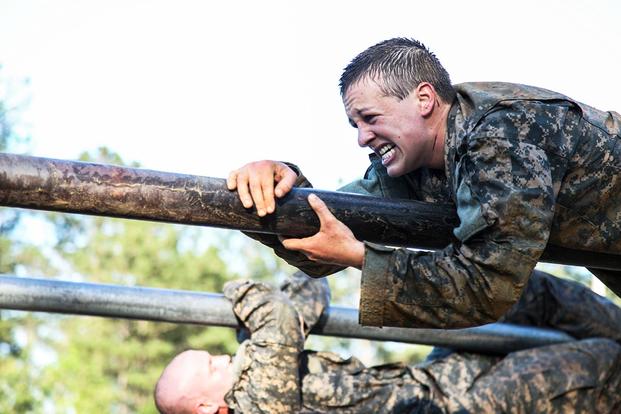It's down to three now -- three female soldiers, out of an original 19, that refuse to give up their dream of earning the coveted Army Ranger Tab.
The one female major and two female first lieutenants failed at two attempts to make it through the first phase of U.S. Army Ranger School, but the trio has still earned the respect of the gatekeepers of this grueling, two-month infantry course.
The female soldiers had been at it for 29 days when the two top leaders at Ranger School offered them a choice - start over from day one with a new class or go home.
All three agreed to start over on June 22.
"Anybody that takes a day-one recycle -- be it a male or female soldier -- it displays an incredible amount of grit and determination; they want to earn the Ranger Tab," Col. David G. Fivecoat, commander of the Airborne and Ranger Training Brigade, told Military.com during a June 5 interview.
Fort Benning, Ga., held its first co-ed course of Army Ranger School on April 20. Nineteen women and 380 men were pre-screened for the combat training course.
Three of the women failed to pass the Ranger Physical Fitness Assessment, a requirement to enter Ranger School. Eight out of 16 female soldiers completed the Ranger Assessment Phase, or RAP week.
But the remaining eight females weren't able to complete the first phase and advance to the second phase of the course. Instead, they were allowed to repeat the Darby Phase along with 101 male candidates.
Fort Benning officials announced May 29 that none of the eight passed the Darby Phase on their second attempt. Three of those females, along with five males, have been invited to start over on day one.
"We do them no favors"
The May 29 announcement touched off a lot of comments on social media criticizing the decision as giving the females special treatment.
Command Sgt. Maj. Curt Arnold, the CSM of the Airborne and Ranger Training Brigade, said that the females are getting treated the same as the males in the course.
"We do them no favors," Arnold said. "There are folks that are being negative saying 'hey you are giving them a chance you didn't give the guys' and that is absolutely not true. Every soldier, if they earn the right, we are going to offer it to them."
Fivecoat added that not everyone who was offered a restart accepted the challenge.
"We offered it to two male soldiers … and neither one of them took it," he said.
The decisions regarding who stays and who goes are made during a board that Fivecoat and Arnold hold at the end of each phase of Ranger School.
"Every Ranger student in every phase -- if they are going to leave the course, they come to see the sergeant major and I," Fivecoat said. "It is a counseling session; we have their file on their performance at Ranger School."
The session looks at how these candidates were evaluated by their peers as well as by Ranger instructors, who use what is known as "spot reports" to identify both positive and negative performance, Fivecoat said.
A spot report could be given for building an excellent terrain model or for falling asleep during non-rest period. Positive spot reports cancel out negative spot reports, and a student can't accumulate three negative spot reports during one phase, Fivecoat said.
"We take every soldier's performance and we evaluate that from start to finish - how are they doing physically? How did they do on peers? How did they do on patrols? Are they in spot trouble?" Arnold said.
"And if they come in and they have done really well but maybe they haven't done well in one area - in this case, they failed patrols but they were close. We do the same thing with male soldiers; we say 'well, this kid is close.'"
Ranger School typically has a 50 percent graduation rate, but both Fivecoat and Arnold said they want as many soldiers to graduate from the course as possible.
"Ranger School does a phenomenal job training the upper echelon of American soldiers," Fivecoat said. "We put them through a very tough course. They learn about leadership. It's tough to motivate your peers when they are tired and hungry and wet and miserable. There is probably not a tougher environment out there. And that creates for the long term better leaders out there in the force that makes the American Army better as a whole."
Earned Respect
In the end, it was not a difficult decision to offer these three females a chance to start over, Arnold said.
"So with these three females -- why did we offer it to them instead of the other five? Because they did significantly better," Arnold said. "They were in better shape, their peers were higher, they were closer on their patrols, they weren't in spot trouble, and so they earned the right to come back just like the male soldiers do and start all over from the beginning."
The three females and five males are now training for the next class, doing pushups, sit-ups and road marches, Fivecoat said.
Whatever happens, the three females that remain have developed a reputation for themselves in the eyes the Ranger instructors, Arnold said.
"These three Ranger school students have earned their respect for the simple fact that they have not quit," he said. "They are taking a day-one recycle and the Ranger instructor, more than anyone, knows how hard that is."
-- Matthew Cox can be reached at matthew.cox@military.com






























